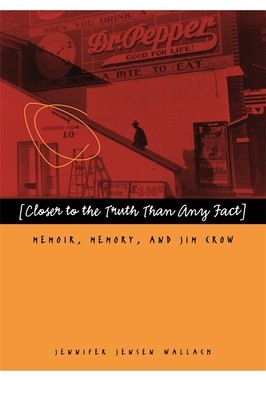
- We will send in 10–14 business days.
- Author: Jennifer Jensen Wallach
- Publisher: University of Georgia Press
- ISBN-10: 0820330698
- ISBN-13: 9780820330693
- Format: 16.2 x 22.9 x 1.9 cm, hardcover
- Language: English
- SAVE -10% with code: EXTRA
Reviews
Description
Although historians frequently use memoirs as source material, too often they confine such usage to the anecdotal, and there is little methodological literature regarding the genre's possibilities and limitations. This study articulates an approach to using memoirs as instruments of historical understanding. Jennifer Jensen Wallach applies these principles to a body of memoirs about life in the American South during Jim Crow segregation, including works by Zora Neale Hurston, Willie Morris, Lillian Smith, Henry Louis Gates Jr., William Alexander Percy, and Richard Wright.
Wallach argues that the field of autobiography studies, which is currently dominated by literary critics, needs a new theoretical framework that allows historians, too, to benefit from the interpretation of life writing. Her most provocative claim is that, due to the aesthetic power of literary language, skilled creative writers are uniquely positioned to capture the complexities of another time and another place. Through techniques such as metaphor and irony, memoirists collectively give their readers an empathetic understanding of life during the era of segregation. Although these reminiscences bear certain similarities, it becomes clear that the South as it was remembered by each is hardly the same place.EXTRA 10 % discount with code: EXTRA
The promotion ends in 17d.15:37:10
The discount code is valid when purchasing from 10 €. Discounts do not stack.
- Author: Jennifer Jensen Wallach
- Publisher: University of Georgia Press
- ISBN-10: 0820330698
- ISBN-13: 9780820330693
- Format: 16.2 x 22.9 x 1.9 cm, hardcover
- Language: English English
Although historians frequently use memoirs as source material, too often they confine such usage to the anecdotal, and there is little methodological literature regarding the genre's possibilities and limitations. This study articulates an approach to using memoirs as instruments of historical understanding. Jennifer Jensen Wallach applies these principles to a body of memoirs about life in the American South during Jim Crow segregation, including works by Zora Neale Hurston, Willie Morris, Lillian Smith, Henry Louis Gates Jr., William Alexander Percy, and Richard Wright.
Wallach argues that the field of autobiography studies, which is currently dominated by literary critics, needs a new theoretical framework that allows historians, too, to benefit from the interpretation of life writing. Her most provocative claim is that, due to the aesthetic power of literary language, skilled creative writers are uniquely positioned to capture the complexities of another time and another place. Through techniques such as metaphor and irony, memoirists collectively give their readers an empathetic understanding of life during the era of segregation. Although these reminiscences bear certain similarities, it becomes clear that the South as it was remembered by each is hardly the same place.

Reviews